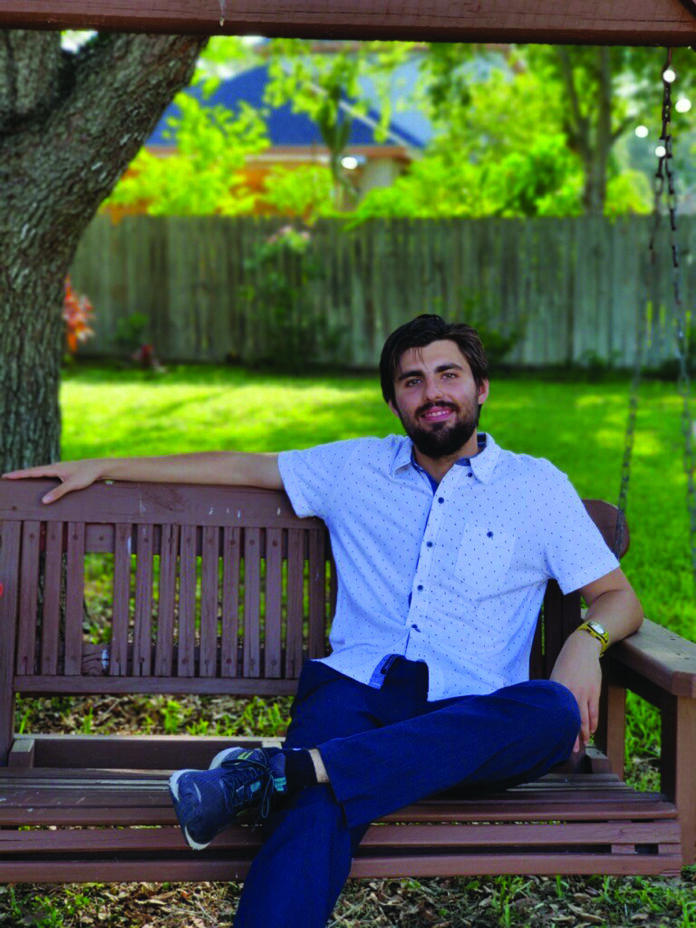Reagan Olguin is a Teach for America educator teaching biology, physics and statistics to ninth through 11th graders since 2019.
What motivated you to apply to join Teach For America and choose to teach in the Rio Grande Valley?
I grew up in Edinburg and attended Robert Vela High School. My family was poor and my mom struggled to ensure my brothers, my sisters, and I had everything we needed. My mom did not get a college degree. She always encouraged me to get an education, so that I could open up a path for myself. A path she did not have. I was extremely lucky to have great coaches, teachers, and mentors who believed in me throughout my life that helped me get into college. I was fortunate enough to get accepted into Rice University in Houston. After three years in college, I was struggling to find a path that felt meaningful. I had never forgotten the people who had pushed me towards getting an education, and I decided that I wanted to be that person for others. A person who helps others open up paths for themselves. I am now teaching here in the Valley and enjoying every second of it.
What has been one of the most surprising things you’ve come to learn about education during your time as a classroom leader?
“ The mediocre teacher tells. The good teacher explains. The superior teacher demonstrates. The great teacher inspires.” — William Arthur Ward
This one of my favorite educational quotes and William Ward encapsulates the most important part of being a teacher — believing in your students and helping them fulfill their dreams.
Inspiring students is less about being a great content expert and more about being a cultivator of relationships. When I first started teaching, I was spending most of my focus on just presenting quality content and there were some scholars who just did not buy into my class. I started to shift towards being a relationship builder and like magic more students were picking up concepts and participating in class. I also found that teaching was much more enjoyable this way. I found excitement in planning my lessons, executing them, and troubleshooting with students after lessons because I had them and their goals in mind during the entire process.
It was a pleasant surprise to know that putting relationships first, and the content second leads to better learning in the classroom.
If you could change one thing for your students, what would it be?
I would love for more project/internship-based classes to be offered for my students. I feel that so many students don’t see the connection of getting an education and pursuing their passion, because they need more outlets to find the things they love. I believe that if students had more opportunities to explore their communities, careers in their communities, and themselves, they would find a passion somewhere that would lead them to higher education, whether it be some sort of trade school or a more traditional university.
What lessons are you learning now that will help you continue to work toward educational equity in the future?
Every day that I am in the classroom I become more capable of deepening my compassion. During this year, I have seen the struggle of students and teachers in my area. Students have had to adapt to a new way of learning. They have had to learn how to be more independent learners, computer literate, and technologically savvy. The same can also be said for the teachers, as well. The resilience of the Edcouch Elsa community has been shown throughout the entire transition to virtual learning. Witnessing the resilience and compassion of the EE community for its children and the other countless communities across the country has taught me one thing. That with compassion and resilience great things can be accomplished. This lesson no matter where I end up will always follow me. The work towards educational equity is tough. However, I know that as long as I stay compassionate and resilient like these communities have during this tragedy, I can help make some great changes, as well.
Can you share an anecdote or personal experience from your classroom or school?
I coach cross-country and track at Edcouch Elsa High School. I have one athlete, Alexis Mata, and he is a senior this year. It has been amazing to see him grow as a young adult and as a competitor. He is the type of young man that every coach loves to have. He is hardworking, honest, and respectful of others. Recently, he has begun to talk to college coaches about furthering his education and athletic career.
A school from Kansas came to talk to him this past week, and seeing him in the act of speaking to the coaches made me so proud of him. I do not have children, but I imagine what I felt was similar to a parent being proud of their child.
Teach for America (TFA) is the national nonprofit organization committed to the idea that one day, all children will attain an excellent education. To this end, the organization partners with communities to inspire the next generation of leaders to address unequal educational opportunities that fall along the lines of race and class. They begin this lifelong work with an initial two-year commitment to teach in some of the nation’s most underserved schools. Here in the Rio Grande Valley, 61 corps members work in seven districts across the region.




